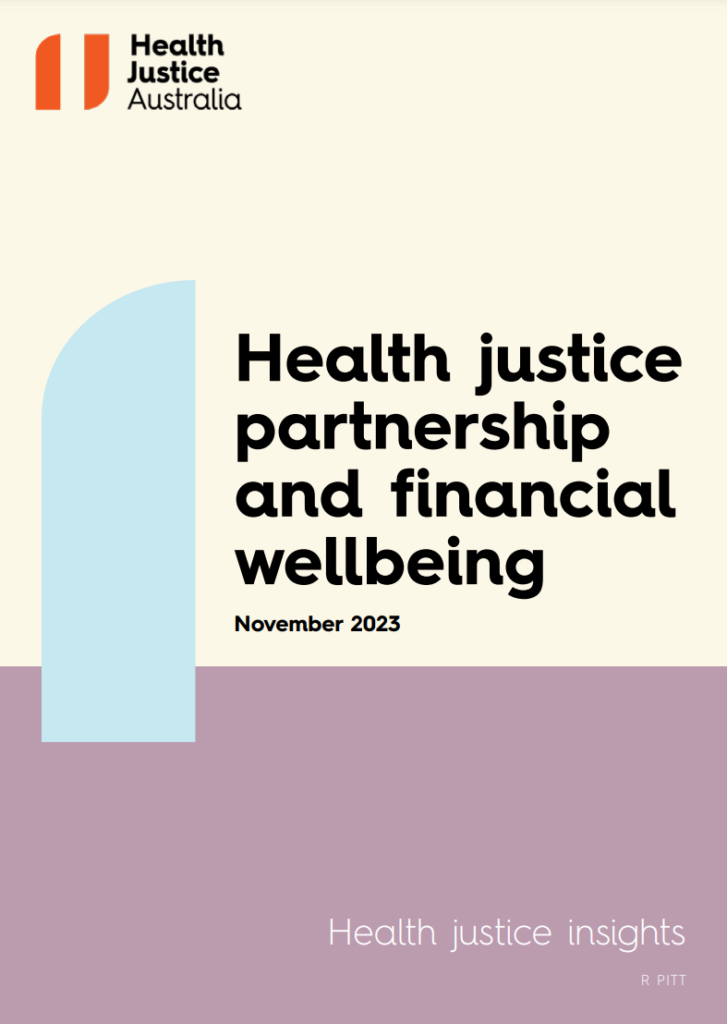Wouldn’t it be great if life’s problems stayed in their own little boxes, preferably arriving in an orderly queue? Unfortunately, we all know they’re more likely to show up all at once, tangled up like an unruly yarn stash. Likewise, when a client approaches health services, it’s not uncommon for their health issues to be tangled up within the broader context of their lives – whether that be their financial wellbeing, debt, employment, or housing. Health justice partnerships work at these intersections, helping to untangle complex problems for the people they affect the most.
Our recent Health Justice Partnership and Financial Wellbeing report shows the place of health justice partnerships in supporting vulnerable Australians who experience financial issues. The report highlights several areas where the intersection of health, legal, and financial issues come up most often – one of these are the tough spots related to mental health and alcohol and other drug use issues.
The toll of a Centrelink debt mistake on William’s health
Health justice partnership evaluation reports have many case studies showing the intersection between health, legal, and financial issues. Consider William’s story, for example. William was on parole after getting out of prison, on medication for his schizophrenia and depression, and trying to turn his life around through the methadone program at Royal Prince Alfred Hospital (RPA), when he received a notification for an $8000 debt from Centrelink to recover payments he’d never actually received.
Like many caught up in the infamous Robodebt scheme and other, less well-known Centrelink accounting errors, William felt powerless and ashamed.
“I’ve got evidence to prove everything, but I haven’t got a voice”, says William.

Between the emotional stress from being wrongly accused and from the financial stress from having his Centrelink income garnished, William’s mental health took a nosedive. The shock to his mental health also posed a serious risk of drug relapse, and his financial struggles threatened to lead him back into the criminal behaviour he thought he’d left behind.
Fortunately for William, the hospital running his methadone program was engaged in a health justice partnership. This meant that RPA hospital staff could easily refer program participants to solicitors and lawyers with the Redfern Legal Centre, particularly where their legal issues were impeding their recovery. After meeting with the solicitor, William felt like he might be able to fight back.
“He believed in me… So I spoke to my partners, stayed calm, maintain, report to my parole, keep up with my medication, and just wait for this battle. And I’m going to fight, I’m going to fight my hardest, every step I take, every breath I’m breathing. He took time and made a phone call for me, it made a big difference.”
Debt waiver requests turned Nandita’s life around
Nandita’s story offers another case study that demonstrates the value of collaboration between health and legal practitioners for dealing with the intersections of financial stress and mental health.
Nandita lives with an acquired brain injury (ABI) resulting from a 40-meter fall while rock-climbing. When Nandita returned to work she became aware that her decision-making abilities had been affected by the ABI. Unable to work, Nandita found herself under significant financial stress and was evicted from her home. She also had a number of debts for large personal loans that she had incurred to support herself when her employment ceased.
Nandita was regularly visiting the Royal Melbourne Hospital for rehabilitation following her ABI. Her social worker suggested she might have legal needs as well as health and rehabilitation needs, and referred her to Inner Melbourne Community Legal (IMCL)’s onsite legal clinic. Nandita explained to the lawyer that her ABI was like “a life-long concussion,” which made it very difficult to manage her finances.
IMCL sent debt waiver requests along with a letter of support from Nandita’s social worker to various debt collectors, asking them to take her circumstances into account. The result was a waiving of nearly $50,000 of Nandita’s outstanding debts.
“Now I am actually able to breathe”, says Nandita. “I can fully focus on my therapy… I can plan for my future.”
The Health Justice Partnership and Financial Wellbeing report
These are just a few of many such stories. The Health Justice Partnership and Financial Wellbeing report found that in the 2021-2022 financial year, 71% of health justice partnerships (HJPs) surveyed had assisted clients with credit/debt issues, and 77% had helped with fines. Meanwhile, as well as several HJPs that target their assistance to those experiencing mental ill-health or issues associated with alcohol and other drug use, more than 80% of HJPs report that at least some of their clients are experiencing mental health conditions and/or addiction.
“It’s not uncommon to see clients experiencing challenging financial circumstances with management of their money in the course of a period of mental ill-health,” said a senior lawyer at IMCL. “People not dealing with things like debts or fines and letting them snowball, because it becomes a source of stress or a block on doing that sort of stuff.”
“Lots of people with massive utility bills, or phone bills or internet provider bills, those sorts of things, that there may be a relatively easy solution, but they’re not able to deal with it because of what’s going on for them when they are unwell. And then it really snowballs, and they come in with very big debts.”
Health justice partnership provides a holistic source of support to people experiencing these intersections. Staff from the health partner organisation can help lawyers assess the client’s capacity and readiness to engage with legal matters, and help build a relationship of trust with the lawyer. Legal help contributes to supporting clients to stabilise their lives, including understanding options and feeling more confident to seek help in future.

“I think it’s important for clients to realise that they can seek help when they have financial difficulty so they don’t become overwhelmed with the process and can focus on their health,” said a Senior Solicitor at Legal Aid NSW. “If a person is being chased for debt, this is a legal issue that a solicitor may be able to help with.”
Health Justice Australia’s recent report shows the place of health justice partnerships in supporting vulnerable Australians experiencing financial issues. Read the Health Justice Partnership and Financial Wellbeing report now to learn more about the intersections of health, legal and financial needs and how health justice partnerships are addressing them.



